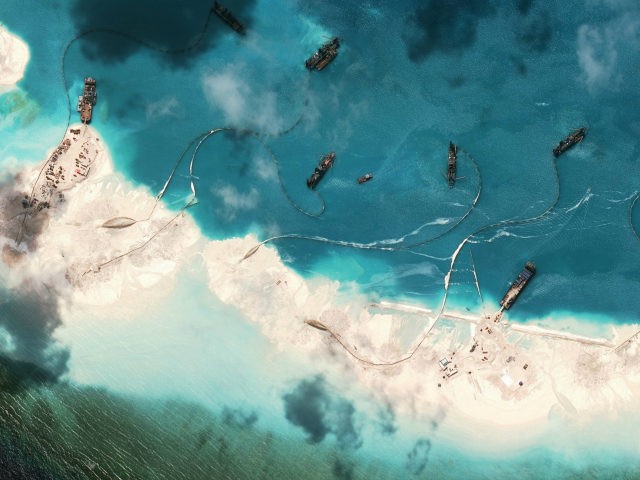The United States, Japan, and Australia stepped away from a meeting of ASEAN, the Association of Southeast Asian Nations, on Monday to issue a joint statement urging China to avoid building more military outposts in the South China Sea.
The Associated Press finds it “ironic” that ASEAN is basically irrelevant to this statement as its foreign ministers couldn’t agree on a position to take against China.
The statement emanating from the U.S., Japan, and Australia was fairly mild, and it’s the sort of thing ASEAN should have been eager to sign on to. Secretary of State John Kerry, Japan’s Fumio Kishida, and Australia’s Julie Bishop merely expressed “serious concerns over maritime disputes in the South China Sea” and declared “strong opposition to any coercive unilateral actions that could alter the status quo and increase tensions.”
The joint statement also urged China to respect international arbitration rulings, “uphold the existing rules-based international order,” and avoid “unilateral actions that cause permanent physical change to the marine environment,” such as constructing military outposts.
In other words, they urged China to stop doing what it has been enthusiastically doing to the South China Sea for the past couple of years.
China has been successful at dividing ASEAN, making side offers to enough members to avoid the kind of unified statement that would have made for choppy diplomatic waters, after an international court refuted China’s broad territorial claims. China has dismissed the Hague ruling as “politically motivated, illegal, and irrelevant,” as the AP summarizes.
Reuters observes that Cambodia prevented the 10-member ASEAN from issuing a statement in support of the international court ruling that favored the Philippines over China, even though the ruling had positive implications for several other ASEAN members who have disputes with China, including Vietnam, Malaysia, and Brunei.
If an agreement cannot be reached, this will mark only the second time in ASEAN’s 49-year-history that it has deadlocked over issuing a statement, and the previous incident, in 2012, also involved Cambodia blocking a statement on the South China Sea.
China was particularly vexed by Japan’s involvement in the statement against it, with a Chinese Foreign Ministry spokesman urging Japan “not to hype up and meddle in the South China Sea issue” because it is “not a concerned party” and because “its disgraceful history” leaves Japan in “no place to make irresponsible comments about China.”
The Wall Street Journal reported on Tuesday that the U.S. announced support for bilateral talks between China and the Philippines over their territorial dispute.
China, in turn, has said nations should not develop and inhabit “presently uninhabited” islands and reefs, which is being taken as a signal that Beijing might ease up on reclaiming territory and building military installations, in the interest of easing tensions.
However, the Wall Street Journal notes that China and the Philippines have locked horns over the fundamental issue of whether bilateral talks would ignore the Hague ruling in favor of the Philippines, as China demands. Southeast Asia expert Ian Storey of the Iseas Yusof-Ishak Institute in Singapore is quoted saying he doubts the U.S. would pressure the Philippines into holding talks with China on those terms.
In sum, all parties seem to agree that the current course of events in the South China Sea is dangerous, but no one seems quite certain how that course can be changed.

COMMENTS
Please let us know if you're having issues with commenting.